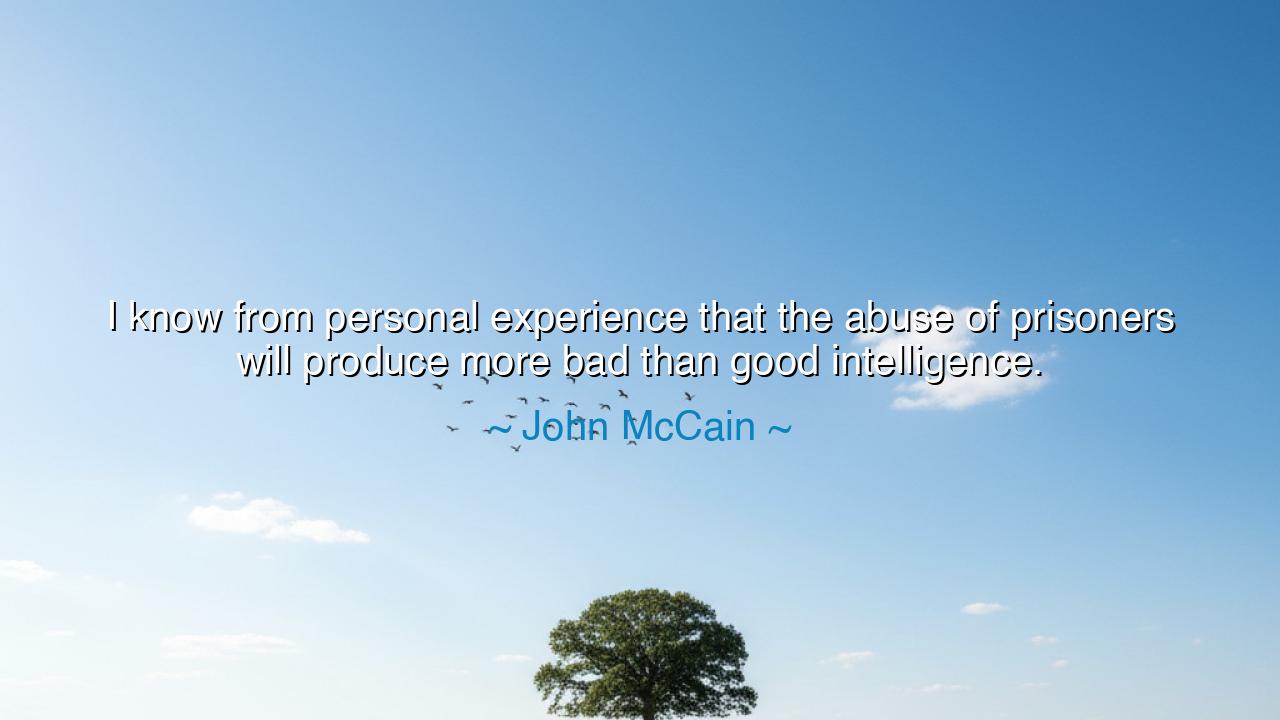
I know from personal experience that the abuse of prisoners will
I know from personal experience that the abuse of prisoners will produce more bad than good intelligence.






When John McCain, a soldier, prisoner, and statesman, declared, “I know from personal experience that the abuse of prisoners will produce more bad than good intelligence,” he spoke not from theory, but from the crucible of human suffering. His words were not polished for politics nor meant to charm an audience—they were forged in the depths of captivity, in the years he spent in a cell of the Hanoi Hilton, a prisoner of war during the Vietnam conflict. In his voice echoes the ancient wisdom of those who have suffered and emerged not hardened, but purified. McCain’s statement is both a warning and a moral testament: that cruelty cannot produce truth, and that the cost of abandoning humanity is far greater than the gain of any fleeting secret.
In the context of his life, McCain’s insight came from the bitterest form of experience. As a young naval pilot, he was shot down in 1967 and captured by North Vietnamese forces. There, over years of torment, he endured torture, isolation, and degradation—his captors seeking confessions, propaganda, and intelligence. He learned, as only a prisoner could, that pain does not compel honesty; it compels submission. Under the agony of coercion, a man will say anything, truth or lie, to make the suffering stop. Thus, McCain’s words rise not merely as a political stance against torture, but as a moral revelation: that the quest for truth cannot coexist with the destruction of human dignity.
To the ancients, this would have been recognized as a truth of virtue. The philosophers of Greece and Rome taught that character and reason are inseparable, and that knowledge obtained through evil means is tainted by its very method. Socrates, who faced death rather than betray his conscience, understood that truth must be pursued through integrity, not force. The Stoics, too, believed that power over another’s body does not grant mastery over their soul. McCain, though living in the modern age, embodied this same spirit. He was a Stoic in the truest sense—suffering, yet unbroken; wounded, yet wiser. His lesson was not only for soldiers, but for all who wield power: to seek truth without honor is to lose both.
There is a paradox that McCain reveals in his quote: that violence, intended to extract truth, instead breeds falsehood. When fear becomes the instrument of inquiry, it corrupts both the victim and the interrogator. History has shown this pattern time and again. During the Inquisition, confessions wrung from the rack and the flame were hollow—fabrications shaped by terror. In the 20th century, totalitarian regimes across the world relied on torture not to find truth, but to manufacture obedience. Every act of brutality became a lie written in flesh. McCain’s words remind us that true intelligence—whether in war or peace—depends not on domination, but on understanding, empathy, and respect for the moral law that binds all human beings.
Yet McCain’s teaching goes beyond the realm of warfare. It speaks to the ethics of leadership itself. In any pursuit of power or knowledge, we are tempted to take shortcuts—to sacrifice principle for expedience, to trade compassion for control. McCain warns us that such paths lead only to ruin. For what begins as a small betrayal of conscience grows into a habit, and soon into identity. The man who uses cruelty to achieve his ends becomes cruel; the nation that abandons its values in fear becomes enslaved by that fear. Thus, McCain’s wisdom is both political and eternal: the methods we use to defend our values must never destroy them.
There is also an element of redemption in his words. McCain, who endured unspeakable torment, did not return with hatred in his heart. Instead, he chose to transform his pain into principle. He stood in the halls of government and spoke against torture even when it was unpopular to do so. He carried his scars not as emblems of vengeance, but as proof that moral strength surpasses physical power. His life is a living testament to the truth he proclaimed—that compassion, not cruelty, preserves the soul, and that a man’s true strength lies in his refusal to abandon his humanity, even in darkness.
So let this teaching be passed down: pain does not reveal truth—only integrity does. In every age, in every arena—whether in the battlefields of nations or the conflicts of the heart—remember that the pursuit of truth demands patience, courage, and mercy. Do not seek understanding through domination, nor wisdom through fear. The heart that listens in compassion will always know more than the hand that strikes. For as John McCain teaches through his own suffering, the abuse of others never brings enlightenment—it only deepens the shadows of ignorance. To seek truth with honor is the highest form of intelligence; to betray it is to lose one’s soul.






AAdministratorAdministrator
Welcome, honored guests. Please leave a comment, we will respond soon